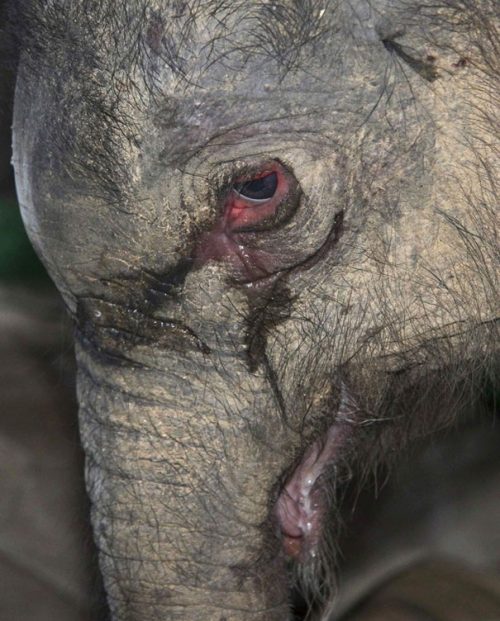
A baby elephant was crying inconsolably after being rejected by his mother, he was heartbroken. He could not believe that the person who was supposed to take care of him would leave him to his fate.
Rejection is a terrible feeling, even more so if it comes from the one you love the most. This sad episode occurred to a newborn elephant who cried for hours because he did not understand what was happening to his mother.
His name is Zhuang Zhuang and he was born in the Shendiaoshan Wildlife Reserve in Rong-cheng, China.

Little Zhuang not only felt his mommy’s rejection, but she tried to hurt him, something that anyone would consider unusual for these creatures that usually accompany their young until they can defend themselves.
At first, the caretakers thought it was a mistake, so they treated the injury and reunited him with his mother. But danger was imminent and the pachyderm attacked her calf again, leaving him totally distressed.
The keepers had to intervene a second time to save the baby elephant.

After this, it was evident that the baby could not be kept in the same place, so it would have to be separated from his mother.
Although this measure was done to protect hid physical integrity, sadly, the emotional damage to the baby elephant had already been done.
Zhuang Zhuang was very distressed by the situation. The caretakers tried to calm the little creature but none of them imagined what was to come after the separation he suffered.
The baby elephant cried for more than 5 hours, as seen in the images.

“He was in a lot of pain and was crying for five hours before I could comfort him. He could not bear to be separated from his mother and it was his mother who was trying to kill him,” said one of the workers.
Disconsolation and sadness intoxicated the heart of this little elephant who, at only hours old, had to experience strong rejection.
Elephant advocate Julia S. Ferdinand and Doctor of Zoology and Ecology Andrea Worthington explained what could be the reason for the rejection.
“In the wild, all herd members grow up caring for all the younger calves. They learn to be parents with the support of their aunts, sisters and the matriarch.”
The specialists added another interesting fact about the behavior of mother elephants: elephants give birth surrounded by their relatives and usually choose a kind of midwife who then helps her to raise the baby.
But this privilege is only for wild elephants, not those in captivity.

“Living in captivity outside of traditional family groups can interfere with the animals’ protective instincts toward their young. If it is a first-time mother, she may be frightened and, due to the pain involved in childbirth, it is possible for the inexperienced mother to attack or hurt the baby, intentionally or unintentionally. The aunts will remove the new calf from the mother, allowing her to recover from the pain and present it slowly,” the specialists pointed out.

As we can see, it was not an evil mother, but the elephant was affected by the birth. This type of disorder is difficult to manage when they are in captivity without the help of their relatives.

Fortunately, a keeper had a special connection with Zhuang and was able to calm him down after a short time.
Perhaps the best solution is to allow all animals to live freely in their natural habitat, although sometimes they need protection because they have special needs.




